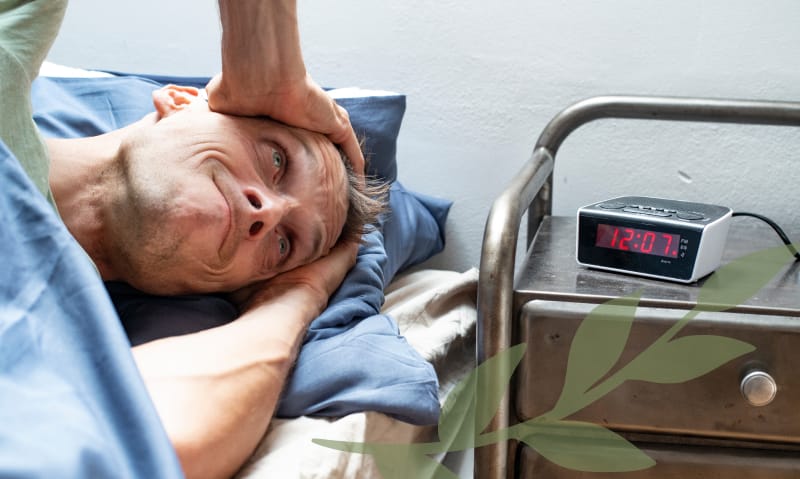1 in 4 Men Have Sleep Apnea, and It Can Affect Your Heart

Quality sleep is important for your health and your head space.
What is sleep apnea? Sleep apnea is a serious condition. It occurs when the airway becomes constricted during sleep, causing the sleeper to jolt awake suddenly. This condition is very common, affecting 1 in 4 men and 1 in 10 women.
You could be experiencing sleep apnea without realizing it, which could result in long-term health consequences.
Signs and Symptoms of Sleep Apnea
Sleep apnea causes the sleeper to wake abruptly throughout the night. However, they tend to fall asleep again quickly and may not remember these incidents. That’s why it’s important to keep an eye out for other symptoms of sleep apnea.
If you’re feeling tired throughout the day and have difficulty concentrating, then sleep apnea disrupting your sleep could be the cause. Waking up with a dry mouth, sore throat, or headache are also common signs of sleep apnea.
Snoring is a common indicator of sleep apnea as well, although sleep apnea is not the only cause. Any of these symptoms are reasons to seek out a diagnosis from a sleep specialist.
Causes of Sleep Apnea
There are two main types of sleep apnea: central sleep apnea and obstructive sleep apnea. Central sleep apnea is a complex neurological condition that affects the signals that control breathing. Obstructive sleep apnea is the more common condition, where the throat muscles relax during sleep, allowing the airway to close.
Many factors can contribute to obstructive sleep apnea. Obesity is one of the most significant sleep apnea causes, as fatty deposits around the upper airway make it easier for the airway to close when the muscles relax.
The condition is much more common in men and older adults. Other factors, such as nasal congestion, smoking, use of alcohol and sedatives, and a variety of medical conditions, can also contribute to the condition. Sleep apnea is also associated with nighttime teeth grinding.
Sleep Apnea Diagnosis
If you have noticed the signs and symptoms of sleep apnea, or you believe you have multiple risk factors for the condition, then seeking out a diagnosis from a sleep specialist can open the door to a variety of treatment options. Only a specialist can diagnose sleep apnea.
You may be recommended an at-home kit to start, followed by an overnight stay at a sleep clinic. The specialist will observe your sleep to determine whether sleep apnea is affecting you and can then recommend potential treatment options.
Oral Appliance Therapy for Sleep Apnea
Oral appliance therapy is one sleep apnea treatment option, generally useful for mild to moderate cases. A sleep apnea oral appliance is similar to the type of mouthguard worn to prevent teeth grinding.
The sleep apnea mouthguard will hold the jaw in a position that prevents the muscles in the throat from relaxing. This is often enough to prevent sleep apnea from affecting your sleep, providing numerous health and lifestyle benefits.
Other Sleep Apnea Treatment Options
There are other sleep apnea treatment options available as well. For moderate to severe cases, a continuous positive airway pressure (CPAP) device is among the most common interventions. A machine is connected to a sleep apnea mask that provides constant pressure as you sleep, keeping the airway from closing.
Other types of devices can achieve a similar effect to a CPAP machine, and supplemental oxygen is sometimes used. Additional approaches may involve treating underlying conditions or surgery to remove tissue, tissue shrinkage, or jaw repositioning to stop the airway from closing.
Why You Should Act Now on Sleep Apnea
Many people underestimate the overall impact sleep apnea can have on their health. Even the obvious symptoms, such as being tired throughout the day, can have a serious impact on your life, reducing your ability to enjoy life and accomplish even routine tasks.
Beyond that, sleep apnea can also lead to a variety of heart problems. Individuals with sleep apnea experience spikes in blood pressure as their bodies react to the drop in oxygen. This can lead to serious problems down the line, including heart attacks. For individuals with an existing heart condition, the low blood oxygen caused by sleep apnea can trigger an adverse event.
Sleep apnea affects both your mental and physical health. The damage it’s doing can continue to accumulate until action is taken, so anyone who notices sleep apnea symptoms should seek out a diagnosis as soon as possible.
Effective Sleep Apnea Treatment Options
If you’ve been diagnosed with sleep apnea, Laurel Manor Dental offers effective treatment options. Our experienced team specializes in oral appliance therapy to help you achieve a good night’s sleep and a better quality of life. Contact us today to schedule your appointment.
